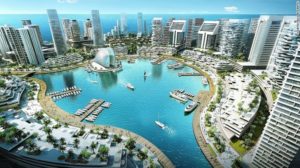
Pitched as Africa’s answer to Dubai, Eko Atlantic is a multibillion dollar residential and business development that is located as an appendage to Victoria Island, and along the renowned Bar Beach shoreline in Lagos. The plan is that it will:
Consist of ten square kilometers (3.86 square miles) of land reclaimed from the Atlantic Ocean.
Be home to quarter of a million people and employ a further 150,000 people who will commute on daily basis
Be billed as a 24-hour, green-conscious, world-class city; and
Attract and retain top multinational corporations.
There is no shortage of doubters and critics of the initiative, which is seen as an exercise in runaway neoliberalism by a country that cannot even ensure 30 days of continuous power supply to its citizens. The truth, however, is that Lagos deserves its dream Eldorado and the economic case for Eko Atlantic is sound.
The only problem is that the plans are in fact not radical enough. Our argument is that this project is under-imagined and should be shored up urgently to match other international projects in the fast-developing countries. In particular, we believe a city should be created along the lines of Paul Romer’s charter city. These are cities in which the governing system is defined by the city rather than by state, provincial, regional or national laws.
This would mean that Eko Atlantic city would operate under high standards of transparency and good governance. Its security would be handled by independent policing standards. This could extend to other aspects of its civil and criminal justice systems. Its sanitary, health, energy supplies, environment and other regulatory rules should be pegged with comparable standards in London, New York, Paris, Dubai and Shanghai.
This would ensure that the laws under which the territory operates are, in essence, free of stifling national regulation which has stood in the way of most African cities operating at optimal levels.
Read more at cnn.com


